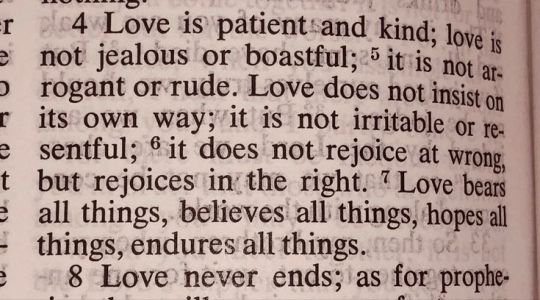#Ecclesiastes 12:13-14
Text
13 The end of the matter; all has been heard. Fear God and keep his commandments, for this is the whole duty of man. 14 For God will bring every deed into judgment, with every secret thing, whether good or evil.
(Ecclesiastes 12:13-14, ESV)
20 notes
·
View notes
Text
A Bonfire of Vanity: Advice From the Wisest Man Who Ever Lived
Tom Wolfe (who wrote, “The Bonfire of the Vanities”) said, “The surest cure for vanity is loneliness.” Another person who understood vanity was (an older and somewhat jaded) King Solomon. After living a life of wealth and achievement, and after marrying hundreds of wives and keeping dozens of concubines, he wrote this: “Now all has been heard; here is the conclusion of the matter: Fear God and…

View On WordPress
#1 Kings 10:23-24#1 Kings 10:6-8#2 Chronicles 1:7#Ecclesiastes 12:13-14#Madonna#Matthew 12:36#Matthew 6:33#Romans 14:12#Solomon#Tom Wolfe#vanity
1 note
·
View note
Text
Verse of the Day 7-10-22
Verse of the Day 7-10-22
Now all has been heard;here is the conclusion of the matter:Fear God and keep his commandments,for this is the duty of all mankind.For God will bring every deed into judgment,including every hidden thing,whether it is good or evil. Ecclesiastes 12:13-14
As a final word, Solomon reminds us of a serious and timeless truth: we are fully accountable to God for our actions. God will evaluate each of…

View On WordPress
0 notes
Text
"THERE'S DANGER IN TWISTING SCRIPTURE!"
Deuteronomy 4:2, “Now listen, Israel, listen carefully to the rules and regulations that I am teaching you to follow so that you may live and enter and take possession of the land that God, the God-of-Your-Fathers, is giving to you. DON’T ADD A WORD TO WHAT I COMMAND YOU, AND DON’T REMOVE A WORD FROM IT. Keep the commands of God, your God, that I am commanding you.” (MSG)
Ecclesiastes 3:14-15,…

View On WordPress
#1 Corinthians 4:20#1 Samuel 13:14#2 Samuel 12:7-10#Believers#Bible#Chef Shermaine#Church#Danger#Deuteronomy 4:2#Ecclesiastes 3:14-15#Encouragement#Faith#God#Holy Spirit#Jesus Christ#Revelation 22:18-19#Scripture#Word of God
3 notes
·
View notes
Text
how to read the Bible

this is in order!
1. John
2. Mark
3. Matthew
4. Luke
5. Genesis
6. Exodus
7. Leviticus
8. Numbers
9. Dueteronomy
10. Romans
11. Galatians
12. Colossians
13. Proverbs
14. Ecclesiastes
15. Job
16. 1 Peter
17. 1 Corinthians
18. 2 Corinthians
19. Ephesians
20. Philippians
21. 1 Thessalonians
22. 2 Thessalonians
23. 1 Timothy
24. 2 Timothy
25. James
26. 2 Peter
27. 1 John
28. 2 John
29. 3 John
30. Jude
31. Psalms
32. Joshua
33. Judges
34. 1 Samuel
35. 2 Samuel
36. 1 Kings
37. 2 Kings
38. 1 Chronicles
39. 2 Chronicles
40. Ezra
41. Nehemiah
42. Jeremiah
43. Lamentations
44. Ezekiel
45. Joel
46. Amos
47. Obadiah
48. Nahum
49. Habakkuk
50. Zephaniah
51. Haggai
52. Zechariah
53. Malachi
54. Micah
55. Hosea
56. Luke
57. Esther
58. Jonah
59. Song of Solomon
60. Acts
61. Titus
62. Philemon
63. Hebrew
64. Isaiah
65. Daniel
66. Revelation
92 notes
·
View notes
Text






— [Again and again, even though we know love’s landscape], Rainer Maria Rilke (trans. Edward Snow)
Ecclesiastes 1:9 by WolfSpider

Hockey Poetry Post ?/?
img. links: 1, 2, 3, 4, 5, 6, 7, 8, 9, 10, 11, 12, 13, 14, 15, 16, 17, 18, 19, 20, 21
#fic rec#I found out about this ship yesterday and now its all I can think about so..#bon appetit#everyone go read this fic its incredible I love it v much#brock faber#jonas brodin#minnesota wild#hockey poetry posts
77 notes
·
View notes
Text

A Gentle Answer Turns Away Wrath
1 A gentle answer turns away wrath, But a harsh word stirs up anger.
2 The tongue of the wise commends knowledge, But the mouth of fools gush out folly.
3 The LORD's eyes are everywhere, Keeping watch on the evil and the good.
4 A gentle tongue is a tree of life, But deceit in it crushes the spirit.
5 A fool despises his father's correction, But he who heeds reproof shows prudence.
6 In the house of the righteous is much treasure, But the income of the wicked brings trouble.
7 The lips of the wise spread knowledge; Not so with the heart of fools.
8 The sacrifice made by the wicked is an abomination to the LORD, But the prayer of the upright is his delight.
9 The way of the wicked is an abomination to the LORD, But he loves him who follows after righteousness.
10 There is stern discipline for one who forsakes the way: Whoever hates reproof shall die.
11 She'ol and Avaddon are before the LORD -- How much more then the hearts of the children of men!
12 A scoffer doesn't love to be reproved; He will not go to the wise.
13 A glad heart makes a cheerful face; But an aching heart breaks the spirit.
14 The heart of one who has understanding seeks knowledge, But the mouths of fools feed on folly.
15 All the days of the afflicted are wretched, But one who has a cheerful heart enjoys a continual feast.
16 Better is little, with the fear of the LORD, Than great treasure with trouble.
17 Better is a dinner of herbs, where love is, Than a fattened calf with hatred.
18 A wrathful man stirs up contention, But one who is slow to anger appeases strife.
19 The way of the sluggard is like a thorn patch, But the path of the upright is a highway.
20 A wise son makes a father glad, But a foolish man despises his mother.
21 Folly is joy to one who is void of wisdom, But a man of understanding keeps his way straight.
22 Where there is no counsel, plans fail; But in a multitude of counselors they are established.
23 Joy comes to a man with the reply of his mouth. How good is a word at the right time!
24 The path of life leads upward for the wise, To keep him from going downward to She'ol.
25 The LORD will uproot the house of the proud, But he will keep the widow's borders intact.
26 The LORD detests the thoughts of the wicked, But the thoughts of the pure are pleasing.
27 He who is greedy for gain troubles his own house, But he who hates bribes will live.
28 The heart of the righteous weighs answers, But the mouth of the wicked gushes out evil.
29 The LORD is far from the wicked, But he hears the prayer of the righteous.
30 The light of the eyes rejoices the heart. Good news gives health to the bones.
31 The ear that listens to the reproof lives, And will be at home among the wise.
32 He who refuses correction despises his own soul, But he who listens to reproof gets understanding.
33 The fear of the LORD teaches wisdom. Before honor is humility.
— Proverbs 15 | Hebrew Names Version (HNV)
The Hebrew Names Version Bible is in the public domain
Cross References: Genesis 13:8; Leviticus 7:18; Deuteronomy 19:14; Deuteronomy 32:22; Judges 8:1; 1 Kings 1:12; Nehemiah 2:2; Psalm 59:7; Proverbs 1:2; Proverbs 1:7; Proverbs 1:25; Proverbs 8:21; Proverbs 9:7; Proverbs 10:1; Proverbs 12:14; Proverbs 13:18; Proverbs 16:24; Proverbs 17:1; Proverbs 18:15; Proverbs 22:5; Proverbs 25:25; Ecclesiastes 4:6; Ecclesiastes 7:5; John 9:31; Acts 1:24; Ephesians 5:15; 1 Timothy 6:9; 1 Timothy 6:11; Hebrews 4:13; 1 Peter 3:15; Revelation 2:7
#righteousness#wisdom#self-control#life#guidance#discretion#Proverbs 15#Book of Proverbs#Old Testament#HNV#Hebrew Names Version bible
20 notes
·
View notes
Text

Embracing the Fruit of the Spirit:
Cultivating Christlike Character
Introduction:
Embark on a transformative journey through the fruit of the Spirit as we explore the qualities that reflect the character of Christ. Join us on this enriching exploration of love, joy, peace, patience, kindness, goodness, faithfulness, gentleness, and self-control, and discover how they can shape our lives and relationships.
Scripture Passage: Galatians 5:22-23 (NIV)
Cross References: John 15:1-17, Colossians 3:12-17, 2 Peter 1:5-8
Commentary:
In Galatians 5, Paul lists the fruit of the Spirit as evidence of a life surrendered to Christ. These qualities—love, joy, peace, patience, kindness, goodness, faithfulness, gentleness, and self-control—flow from a heart transformed by the Holy Spirit and reflect the character of Christ Himself.
In John 15, Jesus uses the analogy of the vine and branches to illustrate the importance of abiding in Him to bear fruit. He emphasizes the intimate connection between abiding in His love and producing fruit that glorifies the Father.
Colossians 3 calls believers to clothe themselves with compassion, kindness, humility, gentleness, and patience, bearing with one another and forgiving as the Lord has forgiven us. These virtues are essential for maintaining unity in the body of Christ.
In 2 Peter 1, believers are encouraged to make every effort to add to their faith goodness, knowledge, self-control, perseverance, godliness, mutual affection, and love. These qualities ensure that we will be effective and productive in our knowledge of our Lord Jesus Christ.
Broader Context:
Love:
1 Corinthians 13:4-7 - The characteristics of love as described by Paul.
John 13:34-35 - Jesus commands his disciples to love one another as He has loved them.
1 John 4:7-12 - Believers are called to love one another because love comes from God.
Joy:
Psalm 16:11 - In God's presence is fullness of joy.
Nehemiah 8:10 - The joy of the Lord is our strength.
John 15:11 - Jesus desires His joy to be in us, and for our joy to be complete.
Peace:
Isaiah 26:3 - God promises perfect peace to those whose minds are steadfast.
Romans 5:1 - Through faith in Jesus, we have peace with God.
Philippians 4:6-7 - God's peace guards our hearts and minds in Christ Jesus.
Patience:
Ecclesiastes 7:8 - Patience is better than pride.
Romans 12:12 - Believers are called to be patient in affliction.
James 5:7-8 - Be patient and stand firm, for the Lord's coming is near.
Kindness:
Ephesians 4:32 - Be kind and compassionate to one another, forgiving each other.
Proverbs 19:22 - What is desired in a man is kindness.
Colossians 3:12 - As God's chosen people, clothe yourselves with kindness.
Goodness:
Psalm 23:6 - Surely goodness and love will follow me all the days of my life.
Romans 12:21 - Overcome evil with good.
Titus 2:14 - Christ gave himself for us to redeem us and purify for himself a people that are his very own, eager to do what is good.
Faithfulness:
1 Corinthians 4:2 - Faithfulness is required of stewards.
2 Timothy 2:13 - God remains faithful even when we are faithless.
Revelation 2:10 - Be faithful, even to the point of death, and I will give you life as your victor's crown.
Gentleness:
Proverbs 15:1 - A gentle answer turns away wrath.
Galatians 6:1 - Restore others gently when they are caught in sin.
1 Peter 3:15 - In your hearts honor Christ the Lord as holy, always being prepared to make a defense to anyone who asks you for a reason for the hope that is in you; yet do it with gentleness and respect.
Self-Control:
Proverbs 25:28 - A man without self-control is like a city broken into and left without walls.
1 Corinthians 9:25 - Everyone who competes in the games goes into strict training. They do it to get a crown that will not last, but we do it to get a crown that will last forever.
Titus 2:11-12 - For the grace of God has appeared, bringing salvation for all people, training us to renounce ungodliness and worldly passions, and to live self-controlled, upright, and godly lives in the present age.
Questions:
Which fruit of the Spirit do you find most challenging to cultivate in your life, and why?
In what ways can you abide more deeply in Christ to bear fruit that reflects His character?
How do the fruit of the Spirit impact your relationships with God and others?
What practical steps can you take to nurture the fruit of the Spirit in your daily life?
Prayer:
Heavenly Father, we thank you for the gift of the Holy Spirit who produces fruit in our lives that reflects the character of Christ. Help us to cultivate these virtues daily, empowering us to love as you love, to bring joy wherever we go, and to walk in peace amidst life's storms. May our lives bear witness to your transformative power and bring glory to your name. Amen.
#faith#christianity#christian faith#jesus christ#bible#faith in jesus#bible scripture#bible verse#christianlife#christ#biblestudy#bible study#bible quote#holy bible#christian#scripture#daily bible study#daily scripture#daily devotionals#Character#Transformation#ChristianLiving#SpiritualGrowth#Love#Joy#Peace#Patience#Kindness#Goodness#Faithfulness
13 notes
·
View notes
Text

“Hailed as the wisest King in history, we might question that, just based on his 1000 wives story!
But it’s a tender story, this King Solomon.
His father, the adored King David, had made one of his greatest mistakes.
He had committed adultery and had the woman’s husband killed.
Not a bright shining moment for anyone, let alone a king. A child was born from that adultery and little Daniel died. Solomon was born next.
Scripture says something about Solomon, it doesn’t say about any other baby.
…..”She bore a son, and called his name Solomon; and the Lord loved him.” (2 Samuel 12:24b)
Solomon is a derivative of the Hebrew word “Shalom” which means Peace.
God had said Solomon would be a man of peace, so he could build the Temple.
A place of God’s Presence.
While we may see our spiritual life as warfare here, let is always be mindful that the Presence of God is Peace.
Solomon was so special to God, that God sent a word to his parents that His nickname for Solomon was “Jedidiah” which means: “Beloved of the Lord”. Isn’t that beautiful?
Solomon was incredibly wise, unbelievably wealthy, and did remarkable things for his country. He was admired and respected
far beyond his kingdom. He wrote like his father, so we have many songs and proverbs from him, a book about life, and even a book on spiritual romance.
He did complete a fine palace for him and those wives, and of course, he built that glorious Temple. He reigned 40 years and actually died quite young at 55 years old.
But Solomon’s greatest battle as a man of peace, was the very thing God specifically warned him about early on.
Unbelieving ungodly wives.
God still tells us not to be unequally yoked. A Believer must marry a Believer.
That is still Scriptural today:
“Do not be unequally yoked together with unbelievers: for what fellowship does righteousness with unrighteousness? and what communion hath light with darkness?” (2 Corinthians 6:13)
But like many people, Solomon did not obey God in that area of his life.
You can tell from his proverbs he learned a lot from those experiences.
While I believe Solomon left God for a season, I believe he’s also in heaven today, because of the last verse in his book, Ecclesiastes 12:13-14:
“This is the end of the matter; all hath been heard: Fear God, and keep His commandments; for this is the whole duty of man. For God will bring every work into judgment, with every hidden thing, whether it be good, or whether it be evil.”
He concluded his book with full recognition of understanding the fear of God, that he would answer to God.
Solomon teaches all of us that no matter how wise, wealthy, or powerful
we may be, we can still make major mistakes in our personal devotion to Christ. We can still choose things and people who will take us away from God. We can still want the excess of sin. Maybe it’s not in every area of our lives, but maybe in one. Maybe it’s secret. Maybe it went viral.
Because God loved Solomon so much, I believe God loves us so much. No matter where we fail Him, and we all have our places, He still waits for us to recognize thd truth.
No matter where our greatest place of learning may be, God still desires the beauty of holiness, purity and purpose.
The sin I battle most, might not be an issue for you at all. What tempts you, may not be a glimpse for me. But we have to look at each other with grace and love, knowing God’s purpose for us all, is bigger than our sin.
Even though Solomon was very wise, he still made stupid mistakes. Remember that, when you want to hate yourself or somebody else for that really dumb sin.
It’s not wisdom or wealth or position that keep us from falling into sin. It’s our walk with God. Our remaining in Christ.
We all may struggle remaining at times. We can’t hate another person, just because their sin is different than ours. God perfects that which concerns us,
is what He says. We don’t have to do the perfecting of each other.
To know Christ and make Him known gives us a purpose like no other. May we live with grace and purpose, firmly remaining in Christ.”
~AnnStewartPorter
10 notes
·
View notes
Text
Previously, on Apocrypals part 5: The Fifth One
As we begin our sixth (!) calendar year of Apocrypals, here is a list of the texts we have covered so far on the show in case you want to read along or catch up. They’re arranged in a way that appeases my systematic nature.
Tanakh/Old Testament:
Genesis (episodes 16-20)
Exodus (episodes 33 and 35)
Leviticus (episode 59)
Numbers (episode 62)
Deuteronomy (episode 65)
Joshua (episode 73)
Judges (episode 80)
Ruth (episode 45)
1 Samuel (episode 89)
2 Samuel (episode 90-91)
1 Kings (episode 99)
2 Kings (episode 106)
Esther (episode 37)
Job (episode 101)
Ecclesiastes (episode 52)
Song of Songs (episode 34)
Isaiah (episode 4)
Jeremiah (episode 43-44)
Lamentations (episode 48)
Ezekiel (episode 55-56)
Daniel (episode 2)
Hosea (episode 108)
Jonah (episode 31)
Micah (episode 74)
Nahum (episode 74)
Deuterocanon/capital-A Apocrypha:
Tobit (episode 13)
Judith (episode 22)
Greek Additions to Esther (episode 37)
1 Maccabees (episode 27)
2 Maccabees (episode 28)
3 Maccabees (episode 53)
4 Maccabees (episode 78)
The Prayer of Azariah aka the Song of the Three Holy Children (episode 2)
Susanna (episode 2)
Bel and the Dragon (episode 2)
The Prayer of Manasseh (episode 6)
New Testament:
Matthew (episodes 8-9)
Mark (episode 7)
Luke (episode 10)
John (episode 11-12)
Acts of the Apostles (episode 1)
Romans (episode 5)
1 Corinthians (episode 25)
2 Corinthians (episode 42)
Galatians (episode 72)
Ephesians (episode 81)
Hebrews (episode 104)
1 John (episode 49)
2 John (episode 49)
3 John (episode 49)
Revelation (episode 50)
Pseudepigrapha (Jewish apocrypha):
The Testament of Solomon (episode 24)
The Story of Ahikar (episode 14)
The Ascension of Isaiah (episode 6)
1 Enoch (episode 39-40)
2 Enoch (episode 61)
3 Enoch (episode 86-87)
Jubilees (episodes 82 and 83)
The Letter of Aristeas (episode 70)
The War of the Sons of Light Against the Sons of Darkness (episode 71)
Joseph and Aseneth (episode 93)
New Testament apocrypha:
The Protevangelium aka Infancy Gospel of James (episode 29)
The Acts of Pilate/Gospel of Nicodemus (episode 23)
Mors Pilati/Death of Pilate (episode 23)
The Acts of Paul and Thecla (episode 22)
The Acts of Peter (episode 3)
The Acts of Peter and Paul (episode 3)
The Acts of Andrew and Matthias (episode 60)
The Acts of Thomas and His Wonderworking Skin (episode 66)
The Life of Xanthippe, Polyxena, and Rebecca (episode 57)
Questions of Bartholomew (episode 41)
Resurrection of Jesus Christ by Bartholomew (episode 41)
The Book of Bartholomew (episode 67)
Acts of John (episode 46)
The Acts of Andrew (episode 97)
Syriac Infancy Gospel (episode 47)
Infancy Gospel of Thomas (episode 54)
Infancy Gospel of Pseudo-Matthew (episode 79)
The Adoration of the Magi (2020 Christmas bonus episode)
The History of Joseph the Carpenter (episode 103)
The First Apocryphal Apocalypse of John (episode 68)
The Second Apocryphal Apocalypse of John (episode 68)
The Third Apocryphal Apocalypse of John (episode 68)
The Apocalypse of Peter (episode 75)
The Apocalypse of Paul (episode 95)
The Gospel of Philip (episode 92)
The Gospel of Mary (episode 92)
The Gospel of Jesus’s Wife (episode 92)
The Gospel of Judas (episode 100)
The Greater Questions of Mary (episode Secret 69)
The Golden Legend of Jacobus de Voragine:
The Life of Saint Nicholas (episode 26)
The Life of Saint Lucy (episode 26)
The Life of Saint Christopher (episode 15)
The Life of Saint Benedict (episode 15)
excerpts from The Passion of the Lord (episode 23)
The Life of Saint Sebastian (episode 58)
The Life of Saint Blaise (episode 58)
The Life of Saint Agatha (episode 58)
The Life of Saint Roch (episode 63)
The Life of Saint Catherine of Alexandria (episode 77)
The Life of Saint Barbara (episode 77)
The Life of Saint Dunstan (episode 85)
The Life of Mary Magdalene (episode 94)
The Life of Saint Martha of Bethany (episode 102)
The Life of Saint Margaret of Antioch (episode 102)
Other:
Historia Trium Regum/The Legend of the Three Kings by John of Hildesheim (episode 30)
Muirchu’s Life of Saint Patrick (episode 36)
The Life of Saint Guinefort (episode 63)
The Life of Saint Mary of Egypt (episode 69)
The Life of Saint Pelagia (episode 69)
The Life of Saint Martin by Sulpicius Severus (episode 76)
The Life of Saint Columba (episode 84)
The Life of Saint Wilgefortis (episode 94)
Lives of cephalophoric saints (bonus episode cephalo4)
Stories of the Baal Shem Tov from The Golden Mountain (episode 96)
More stories of the Baal Shem Tov from The Golden Mountain (episode 107)
Solomon and Ashmedai (bonus episode double chai)
Listener questions (episode 32)
Bible trivia questions (episode 38)
Halloween-themed Chick tracts (episode 51)
Christmas-themed Chick tracts (episode 98)
Bible Adventures and the Wisdom Tree catalogue of video games (episode 64)
The Da Vinci Code, the movie (episode 88)
Guess the Bible character from Persona 5 (bonus episode Persona 5)
El Shaddai: Ascension of the Metatron (episode 105)
You can find links to all these episodes with show notes and more on the Apocrypals wiki
#apocrypals#podcast#podcasts#religion#bible#christianity#judaism#apocrypha#old testament#new testament#hagiography
88 notes
·
View notes
Text

Ps.90:12 So teach us to number our days, that we may gain a heart of wisdom.
Exciting, Provocative, New!
Something every new life experiences, and every new generation. They are the first to feel, the first to have sex, the first to experience injustice the first to feel special or depressed.
To them their is no commonality in the history of mankind it unreality if they don’t experience it; that old man old woman not human, let alone hundreds thousands of years ago; unreality make believe entertainment ; they’re the first to breath air, feel fear, have anger. 50 to 70 years from “new” reality of the human experience will smack new down into awful evil, self-centre unreality of all humans.
That is why the young don’t get law, they feel law, it doesn’t take a PHD to know evil exist in all of us throughout history, feeling and new doesn’t prevent evil it just promotes more of it. Sadly, the new won’t experience their own destructive fruitage until their old than they will have the wisdom understand it, but not prevent it!
Ecclesiastes 1:2 "Vanity of vanities," says the Preacher; "Vanity of vanities, all is vanity."
Proverbs 30:11 There is a generation that curses their father, and doesn't bless their mother.
Proverbs 30:12 There is a generation that is pure in their own eyes, yet are not washed from their filthiness.
Proverbs 30:13 There is a generation, oh how lofty are their eyes! Their eyelids are lifted up.
Proverbs 30:14 There is a generation whose teeth are like swords, and their jaws like knives, to devour the poor from the earth, and the needy from among men.
Ecclesiastes 1:4 One generation goes, and another generation comes; but the earth remains forever.
Ps.90:1 <<A Prayer by Moses, the man of God.>> Lord, you have been our dwelling place for all generations.
90:2 Before the mountains were brought forth, before you had formed the earth and the world, even from everlasting to everlasting, you are God.
90:3 You turn man to destruction, saying, "Return, you children of men."
90:4 For a thousand years in your sight are just like yesterday when it is past, like a watch in the night.
90:5 You sweep them away as they sleep. In the morning they sprout like new grass.
90:6 In the morning it sprouts and springs up. By evening, it is withered and dry.
90:7 For we are consumed in your anger. We are troubled in your wrath.
90:8 You have set our iniquities before you, our secret sins in the light of your presence.
90:9 For all our days have passed away in your wrath. We bring our years to an end as a sigh.
90:10 The days of our years are seventy, or even by reason of strength eighty years; yet their pride is but labor and sorrow, for it passes quickly, and we fly away.
90:11 Who knows the power of your anger, your wrath according to the fear that is due to you?
90:12 So teach us to number our days, that we may gain a heart of wisdom.
4 notes
·
View notes
Text
In Christianity, an anchorite or anchoret (female: anchoress) is someone who, for religious reasons, withdraws from secular society to be able to lead an intensely prayer-orientated, ascetic, or Eucharist-focused life. While anchorites are frequently considered to be a type of hermit,[2] unlike hermits they were required to take a vow of stability of place, opting for permanent enclosure in cells often attached to churches. Also unlike hermits, anchorites were subject to a religious rite of consecration that closely resembled the funeral rite, following which they would be considered dead to the world and a type of living saint. Anchorites had a certain autonomy, as they did not answer to any ecclesiastical authority other than the bishop.[3]
From the 12th to the 16th centuries, female anchorites consistently outnumbered their male counterparts, sometimes by as many as four to one (in the 13th century) which eventually dropped to two to one (in the 15th century).[5] The sex of a high number of anchorites, however, is not recorded for these periods.[6]
The anchoritic life became widespread during the early and high Middle Ages.[8] Examples of the dwellings of anchorites and anchoresses survive, a large number of which are in England. They tended to be a simple cell (also called anchorhold) built against one of the walls of the local village church.[9] In Germanic-speaking areas, from at least the tenth century it was customary for the bishop to say the Office of the Dead as the anchorite entered their cell, to signify the anchorite's death to the world and rebirth to a spiritual life of solitary communion with God and the angels. Sometimes, if the anchorite was walled up inside the cell, the bishop would put his seal upon the wall to stamp it with his authority. Some anchorites, however, freely moved between their cells and the adjoining churches.[10]
Most anchoritic strongholds were small, perhaps at most 3.7 to 4.6 m (12 to 15 ft) square, with three windows. Viewing the altar, hearing Mass, and receiving the Eucharist were possible through one small, shuttered window in the common wall facing the sanctuary, called a "hagioscope" or "squint". Anchorites provided spiritual advice and counsel to visitors through these windows, gaining a reputation for wisdom.[11] Another small window allowed access to those who saw to the anchorite's physical needs. A third window, often facing the street but covered with translucent cloth, allowed light into the cell.[3]
Anchorites committed to a life of uncompromising enclosure. Those who considered leaving possibly believed their souls might be damned for spiritual dereliction.[12]: 93 [a] Some refused to leave their cells even when pirates or looters were pillaging their towns and consequently burned to death when the church was torched.[13] They ate frugal meals, spending their days both in contemplative prayer and interceding on behalf of others. Their body waste was managed using a chamber pot.[14]Some anchorholds had a few small rooms or attached gardens. Servants tended to the basic needs of anchorites, providing food and water and removing waste. Julian of Norwich, for example, is known to have had several maidservants, among them Sara and Alice. Aelred of Rievaulx wrote an anchorite rule book, c. 1161, for his recluse sister titled De Institutione Inclusarum;[15] in it, he suggested keeping no housemates other than an older woman, to act as companion and doorkeeper, and a young maid as domestic servant.[16]
honestly? with the garden, not that bad, for the time
there was one 1945-1990!
Following a private audience with Venerable Pope Pius XII, Crotta was invited into the Camaldolese monastery in Rome on November 21, 1945 to live as a "recluse" or lay anchoress. She then took the name Maria-Nazarena of Jesus.[3]
Nazarena was to remain in a secluded cell in that monastery, leading a strict ascetic regime for the rest of her life, hearing Mass through a grille and receiving her food and messages from the Mother Superior and the other nuns through a slot in the door to her cell. She spoke to no one directly, except once a year, when she spoke to the priest who served as her spiritual director. Those meetings could last an entire day, during which she would talk for hours.
she was from connecticut!
20 notes
·
View notes
Text

If God has planted eternity in the human heart then how should we live?
The message below takes 4 minutes to read.
When we consider the meaning and purpose of our life, it is important to put our lives in the context of eternity. The Preacher (aka King Solomon) says in Ecclesiastes 3:11 that God ‘has set eternity in our hearts’, which I take to mean that, God has given we humans an awareness/consciousness that there is something beyond our natural lives.
An awareness that there is someone and something that is beyond our understanding of time.
Eternity represents a fork in the road, when we are trying to fathom out, just exactly what is the meaning or purpose of our life. Are you living for time, or for eternity?
If we have taken the Jesus fork on the road, then perhaps today might be a fitting time to revise our bucket lists but this time in the light of eternity.
So what is on your personal bucket list today? A bucket list, as you know, is a list of all the main things we want to do before we die i.e. before we kick the bucket! Here are the most popular types of items on most peoples' bucket list
To go somewhere they have never been
To do something they have never done
To do something exciting/dangerous/extravagant perhaps just one time in your life.
This raises the question what can we take from this life into the next?
Here is what Jesus said in Matthew 6:19 “Do not store up for yourselves treasures on earth, where moths and vermin destroy, and where thieves break in and steal. 20 But store up for yourselves treasures in heaven, where moths and vermin do not destroy, and where thieves do not break in and steal.
So, what does this mean?
So, what treasure we can store up in heaven?
Here is what the Apostle Paul said in the key passage about the judgement of believers works.
1 Corinthians 3:10 According to the grace of God, which is given unto me, as a wise Master Builder, I have laid the foundation, and another buildeth thereon. But let every man take heed how he buildeth thereupon.
Paul likened the Christian life to constructing a building and tells us we must build carefully.
11 For other foundation can no man lay than that is laid, which is Jesus Christ.
For every one of us
12 Now if any man builds upon this foundation gold, silver, precious stones, wood, hay, stubble. Our works not our salvation. In your life are you building a palace or a mud hut? [1]
13 Every man's work shall be made manifest: for the day shall declare it, because it shall be revealed by fire; and the fire shall try every man's work of what sort it is. Gold,Silver and Precious Stones are fireproof but not Wood,Hay and Stubble.
We will all bring our big bag of works to the bema (platform) judgement.
14 If any man's work abides which he hath built thereupon, he shall receive a reward.
The various crowns to cast at Jesus’ feet.
15 If any man's work shall be burned, he shall suffer loss: but he himself shall be saved; yet so as by fire. Clearly this is talking about loss of reward not loss of salvation.
The fire will differentiate between work we have done in the flesh (our own ideas, our own power) and work we have done by the Spirit (God’s ideas and God’s power).
So, in closing here are some things to consider for our spiritual bucket lists in the light of eternity. Here are some ideas of the type of thing that might bring you gold, silver, and precious stones in heaven.
At this stage I believe this could be an opportunity in which God wants to communicate with each one of us personally today, so be open to what the Lord might be saying to you personally.
1] Go somewhere for God you have never been, maybe a short-term mission Testimony-Brazil, Tanzania-made many friends who still are today!
2] Do something for God you have never done before, do something creative write something, sing something, paint something, give something, pray something, bless someone Use all your God-given creative talents to full effect.
3] Do something exciting/dangerous/extravagant for God, perhaps just this one time in your life, share the Gospel message, tell a friend or neighbour about your faith, be a good Samaritan to someone in need.
Or what about the wonderful woman who poured the alabaster box of costly perfume on Jesus’ feet? She did not store up her treasure on earth.
Here is her story, in
Luke 7:37 And, behold, a woman in the city, which was a sinner, when she knew that Jesus sat at meat in the Pharisee's house, brought an alabaster box of ointment,38 And stood at his feet behind him weeping, and began to wash his feet with tears, and did wipe them with the hairs of her head, and kissed his feet, and anointed them with the ointment.
Those present had doubts and concerns about the woman, but Jesus praised her, whoever has much forgiven , loves much. What about you?
Prayer
Father God, we ask you in Jesus’ name, to teach us how to live and to love in the light of eternity. Show us all the tasks and opportunities of that are from you which will produce treasure in heaven. Show us what is on your list for me specifically and help me to live out and complete your plan (bucket list) for my life.
Amen
[1] Roger Price CCF Tapes BBS 023
8 notes
·
View notes
Text
Lesson 043: Dreams
Genesis 43:26 - And when Joseph came home, they brought him the present which was in their hand into the house, and bowed down before him to the earth.
When we first encountered Joseph in Genesis chapter 36 we learned he was Jacob’s favorite son. Joseph’s ten brothers resented him for this fact. They hated even more when he told them of dreams he was having such as the one told in Genesis 37:7:
”There we were, binding sheaves in the field. Then behold, my sheaf arose and also stood upright; and indeed your sheaves stood all around and bowed down to my sheaf.”
Let’s read together Genesis 28:12-15; Genesis 31:10-13; and Genesis 37:8-11.
Interestingly, Jacob had a previous experience with dreams. He was given dreams that he knew were from God. Jacob did not understand Joseph’s dream but he could not discount it. He kept the matter in mind.
Many years later, Joseph’s dream finally came to pass. Joseph’s brothers unknowingly bowed before Joseph when they came to Egypt looking to buy grain.
Let’s read together Numbers 12:6; Deuteronomy 13:1-5; Job 33:14-16; Ecclesiastes 5:7; Isaiah 8:20; Jeremiah 23:25-28; Joel 2:28; and Matthew 27:19.
How do you know if the dream you had was a product of your own mind or a vision from God? The Bible has many instances where God spoke to people through a dream. However, the Bible also tells of other instances where false prophets led people astray with their dreams.
If you want to know God is actually speaking to you through a dream, you need to study His word and know it for yourself. True dreams from God will always harmonize with the teachings of the Bible.
2 notes
·
View notes
Text
SEARCH FOR SATISFACTION
"History merely repeats itself. It has all been done before. NOTHING UNDER THE SUN IS TRULY NEW."
Ecclesiastes 1:9 (NLT)
* Based on what Solomon said, the author of the Bible passage used as our text; Nothing in the world is truly New.
- Do not be carried away with the New things, things in vogue, because they are not truly New.
- Jesus Christ in one of His parables likened some people to the Seed sown among the thorns (Mark 4:3-9,14-20). THOSE who heard the Word of God and did not allow it to take Root in them, but such allowed the cares of life and the deceitfulness of riches to choke the Word in them (Mark 4:18,19).
READ: 1 Timothy 6:9,10,17
- Riches have deceit, because humans are insatiable. If you are pursuing the things of the world, that might be at the detriment of your soul and your place in God's Kingdom (Matthew 6:33; 16:36).
- King Solomon was stating a fact in the passage of the Bible used as the text, and he was talking out of his experience.
- At the beginning of his life, he wanted Fulfilment, and thought he could get that by exploring a number of things (Ecclesiastes 1:17; 2:1-11).
- When he did, he was able to get a number of things he desired, but those things did not give him the Fulfilment he was desiring for:
10 ANYTHING I WANTED, I WOULD TAKE. I DENIED MYSELF NO PLEASURE. I even found great pleasure in hard work, a reward for all my labours. 11 BUT as I looked at everything I HAD WORKED SO HARD TO ACCOMPLISH, IT WAS ALL SO MEANINGLESS—LIKE CHASING THE WIND. THERE WAS NOTHING REALLY WORTHWHILE ANYWHERE" (Ecclesiastes 2:10,11 NLT).
READ: Ecclesiastes 1:16
- The man talking in the above passage of the Bible had tasted good things of life. He had Riches, honour, greatness, and what have you; but at the end, he said all is meaningless.
- About the close or the end of his life, he began to talk about vanities (Ecclesiastes 1:2,14; 2:19,21,26; 3:19; 6:2).
- He realizes that life is meaningless without one's Maker. In other words, without God in your life, or without a relationship with God the Father through Jesus Christ, life is meaningless:
1 REMEMBER NOW YOUR CREATOR IN THE DAYS OF YOUR YOUTH, BEFORE THE DIFFICULT DAYS COME, And the years draw near when you say, "I have no pleasure in them" 6 REMEMBER YOUR CREATOR BEFORE THE SILVER CORD IS LOOSED, Or the golden bowl is broken, Or the pitcher shattered at the fountain, Or the wheel broken at the well. 13 LET US HEAR THE CONCLUSION OF THE WHOLE MATTER: FEAR GOD And KEEP HIS COMMANDMENTS, FOR THIS IS MAN'S ALL. 14 FOR GOD WILL BRING EVERY WORK INTO JUDGMENT, INCLUDING EVERY SECRET THING, WHETHER GOOD OR EVIL (Ecclesiastes 12:1,6,13,14 NKJV).
- The man talking here had tasted life, seen good things of life, and with all his achievements or attainments, he discovered or realized, without God in one's life, everything is meaningless.
- Relationship with God the Father through Jesus Christ makes life meaningful. True fulfilment is found in God through salvation in Christ Jesus (John 15:5).
* Pursue Godliness and Righteousness.
- All which some people are pursuing, including some Believers, are the things of the world, which are in vogue, currently reigning or trending in the world—they wanted to be part of what is going on (Colossians 3:1,2).
- Many failed to serve God or be committed in their relationships with Him, because of the current trend of the world: "BUT SHE [he] WHO LIVES IN PLEASURE IS DEAD WHILE SHE [he] LIVES" (1 Timothy 5:6 NKJV).
READ: 1 John 2:15-17
- Whatever you are pursuing in life that makes you lose your relationship or fellowshipping with God, and your place in God's Kingdom on Earth, is meaningless—vanity.
- Nothing you achieved, or the position you attained, gives Joy and satisfaction, without God in your life (Philippians 3:7,8).
- If God is not involved in whatever you are pursuing, your goal, as a Believer; It is irrelevant. Whatever God is involved in, only such gives satisfaction and joy and Fulfilment.
* Worldly attainments cannot not give you Joy and Fulfilment:
"HE WHO LOVES MONEY WILL NOT BE SATISFIED WITH MONEY, Nor HE WHO LOVES ABUNDANCE WITH ITS GAIN. THIS TOO IS VANITY (emptiness)" (Ecclesiastes 5:10 Amps).
- After you might have gotten whatever you are pursuing, you would realize or discover that you are yet satisfied.
- Nothing gives Joy, satisfaction, and Fulfilment, outside God: "I THOUGHT ABOUT ALL MY HARD WORK, And I FELT DEPRESSED" (Ecclesiastes 2:20 Contemporary English Version).
"SO I GAVE UP IN DESPAIR, QUESTIONING THE VALUE OF ALL MY HARD WORK IN THIS WORLD" (Ecclesiastes 2:20 NLT).
- The truth is, answer to satisfaction and Fulfilment is found in God through Christ Jesus, and in Him only.
- The quest of Solomon was, he wanted to find Joy, satisfaction, and Fulfilment in life, through the hard work, accumulation of wealth, and pleasures.
- He eventually discovered or realized after he got all he was pursuing, that, having those things could not give him Joy, satisfaction, and Fulfilment. Life is vanity, meaningless, without God:
4 I ALSO TRIED TO FIND MEANING BY BUILDING HUGE HOMES FOR MYSELF And BY PLANTING BEAUTIFUL VINEYARDS. 5 I MADE GARDENS And PARKS, FILLING them with ALL KINDS OF FRUIT TREES. 11 BUT AS I LOOKED AT EVERYTHING I HAD WORKED SO HARD TO ACCOMPLISH, IT WAS ALL SO MEANINGLESS—LIKE CHASING THE WIND. THERE WAS NOTHING REALLY WORTHWHILE ANYWHERE" (Ecclesiastes 2:4,5,11 NLT).
* What makes life meaningful?
- Your relationship with God makes life meaningful.
- Having abundant of wealth or blessings might not be outright bad, only If the things are gotten or acquire whilst your relationship and fellowshipping with God are intact and sound.
- Living comfortably is not against God's Will, but having wealth without God is meaningless—vanity:
15 THEN HE [Jesus] SAID, “Beware! GUARD AGAINST EVERY KIND OF GREED. LIFE IS NOT MEASURED BY HOW MUCH YOU OWN.” 20 “But God said to him, ‘You fool! You will die this very night. THEN WHO WILL GET EVERYTHING YOU WORKED FOR?’ 21 “Yes, A PERSON IS A FOOL TO STORE UP EARTHLY WEALTH BUT NOT HAVE A RICH RELATIONSHIP WITH GOD” (Luke 12:15,20,21 NLT).
READ: Luke 12:15-21
- Solomon could not find Fulfilment in all he acquired, his achievements, because he turned away from God Who made him—the source of his success and greatness (1 Kings 11:9-11).
- When you permitted no God in your life, or you turned away from Him, your life becomes empty—meaningless (Deuteronomy 33:15).
- What makes life meaningful is the God in your life. Life ordinarily has no meaning without God!
* Allow Jesus Christ to come into your life, and reconcile you with God (2 Corinthians 5:17-19; Revelation 3:20).
- Do not abandon God because of whatever you are pursuing, there is nothing outside Him.
- When Adam and Eve disobeyed God, they did contrary to the instruction or commandment given to them (Genesis 2:16,17); they discovered their nakedness as a result (Genesis 3:6,7).
- If you had known God, but decided to turn your back against Him or leave Him, you would discover that you are nothing, a nobody, without Him (John 15:4-6).
- Adam and Eve sewed fig leaves to cover their nakedness (Genesis 3:7).
- The truth is, there is no covering for anyone who has no relationship with God through Christ Jesus. Nothing in life can cover your nakedness like your relationship and fellowshipping with God—not even your wealth or whatever achievement in life (Revelation 3:17,18).
- Nothing can take the place which God has reserved for Himself in the heart of humans.
- Serve God and build intimacy with Him, therein you find Joy, satisfaction, and meaning and Fulfilment in life.
* If you are yet to surrender your life to Christ Jesus, that is, you have not accepted Him as your Lord and Saviour; take a step now, tomorrow might be too late (2 Corinthians 6:1,2).
- Believe in your heart that He died for your Sins and resurrected that you might be justified (Romans 4:25).
THUS, tell Him you repent of your Sins and ask Him to come into your life and take His place (Revelation 3:20); CONFESS with your mouth that you accepted Him as your Lord and Saviour (Romans 10:9,10);
AND that He would write your name in the Book of Life (Revelation 20:15; 21:27).
* You will not fail in Jesus' name.
- Should there be any ailment in your body, I declare Such ailment rooted up in Jesus' name.
- I declare total health for you in the mighty name of Jesus Christ.
Peace!

#christianity#gospel#christian blog#christian living#jesus#devotion#the bible#my writing#faith#prayer
2 notes
·
View notes
Text
God Made Every Thing Beautiful
Ecclesiastes 3:1-22
1. To every thing there is a season, and a time to every purpose under the heaven:
2. A time to be born, and a time to die, a time to plant, and a time to pluck up that which is planted;
3. A time to kill, and a time to heal; a time to break down, and a time to build up;
4. A time to weep, and a time to laugh; a time to mourn, and a time to dance;
5. A time to cast away stones, and a time to gather stones together; a time to embrace, and a time to refrain from embracing;
6. A time to get, and a time to lose; a time to keep, and a time to cast away;
7. A time to rend, and a time to sew; a time to keep silence, and a time to speak;
8. A time to love, and a time to hate; a time of war, and a time of peace.
9. What profit hath he that worketh in that wherein he laboureth?
10. I have seen the travail, which God hath given to the sons of men to be exercises in it.
11. He hath made every thing beautiful in his time: also he hath set the world in their heart, so that no man can find out the work that God maketh from the beginning to the end. 12. I know that there is no good in them, but for a man to rejoice and to do good in his life.
13. And also that every man should eat and drink, and enjoy the good of all his labour, it is the gift of God.
14. I know that, whatsoever God doeth, it shall be for ever: nothing can be put to it , nor any thing taken from it: and God doeth it, that men should fear before him.
15. That which hath been is now; and that which is to be hath already been; and God requireth that which is past.
3 notes
·
View notes